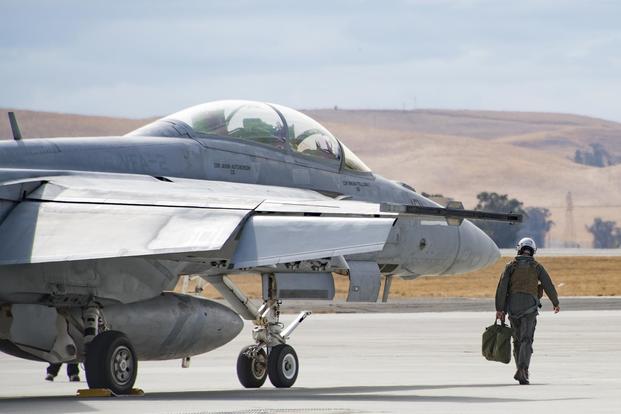Pentagon officials called Thursday for more funding to boost flying hours and improve maintenance in the wake of the deadly crash of a Navy F/A-18 Super Hornet off the Florida coast.
"It's important that we not necessarily draw direct correlations" between the funding cuts under the sequestration process and the accident, "but it is important that we have stable funding," said Dana White, the Pentagon's chief spokesperson.
Without the funding, "capabilities erode and things are delayed," White said in urging the congressional appropriations committees to give quick passage to legislation that would give the Defense Department a total of $1.4 trillion for fiscal 2018 and 2019.
At a Pentagon briefing with White, Marine Lt. Gen. Kenneth McKenzie, the Joint Staff director, said, "I don't know how" funding cuts may have contributed to the Florida accident, "but I can tell you that pilots are going to be flying more and training is going to pick up."
The Navy said the two members of the Super Hornet's aircrew died as a result of the crash off Key West, Florida, on Wednesday in their final approach to Boca Chica airfield.
A spokesman with Naval Air Forces Atlantic, Cmdr. Dave Hecht, told Military.com the pilot and weapons system officer of the Super Hornet had been taken to Lower Keys Medical Center in Key West but died as a result of their injuries. Their names were being withheld.
President Donald Trump said in a statement posted on Twitter early Thursday: "Please join me with your thoughts and prayers for both aviators, their families and our incredible @USNavy."
The latest accident follows on numerous warnings from Defense Secretary Jim Mattis and the service chiefs that the forward deployment of forces in high-tempo operations has led to cutbacks in funding for flying hours, aircraft maintenance, and overall training for stateside troops.
Mattis put the onus on Congress. "We as a nation have got to come to grips with this," he said in unveiling the National Defense Strategy in January.
Citing the use of continuing resolutions and threatened government shutdowns in reaching defense budget agreements, Mattis said:
"For too long, we have asked our military to stoically carry a 'success at any cost' attitude, as they worked tirelessly to accomplish the mission with inadequate and misaligned resources simply because the Congress could not maintain regular order. Loyalty must be a two-way street."
Air Force Secretary Heather Wilson told reporters at a Pentagon briefing last month, "The most important thing we need to do is we need to lift sequestration as it's currently structured.
"Risk accumulates over time, and you just don't know exactly when things will break," she said. "But we are stretching the force to the limit, and we need to start turning the corner on readiness."
At a House Armed Services Readiness subcommittee hearing last month, Vice Adm. Mike Shoemaker, commander of Naval Air Forces, said, "We are meeting the combatant commanders' requirement for ready, lethal carriers and air wings forward, but at a tremendous cost to the readiness of our forces at home."
Sen. John McCain, R-Arizona, chairman of the Senate Armed Services Committee, has often stated that more service members now are being killed in training than on the battlefield.
In a statement Thursday, McCain said, "The tragic F-18 crash in Florida yesterday reminds us all of the dangers our service members face every day.
"With our men and women in uniform now suffering more fatalities during training than in combat, we must do everything we can to keep them safe," he said.
"We need to ensure we are providing our service members the resources they need to maintain the highest readiness levels -- from equipment to proficiency. Anything less is not only unwise, but an abrogation of our duty," McCain continued.
In an op-ed last September for The Washington Post, Rep. Mac Thornberry, chairman of the House Armed Services Committee, wrote, "A total of 185 service members lost their lives in non-combat accidents over the past three years -- more than four times as many as the 44 who were killed in combat."
-- Richard Sisk can be reached at Richard.Sisk@Military.com.













